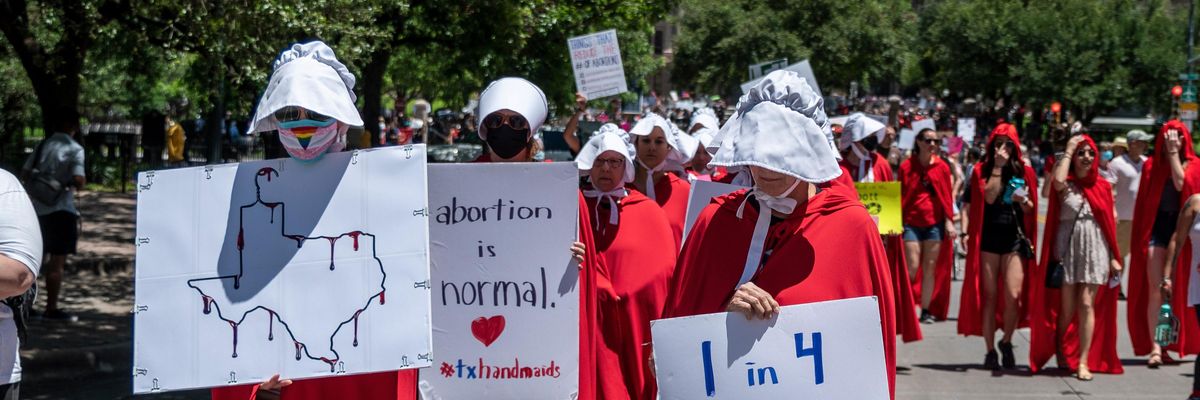With one of the most extreme abortion bans this country has ever seen now in effect, politicians, neighbors, and even complete strangers can sue anyone who helps a person access an abortion in Texas after six weeks. This is a full-scale assault on abortion access.
1. What is Texas's six-week abortion ban (S.B. 8)?
It's a dangerous law set that took effect on September 1, and which rewards people who block a Texan from getting an abortion.
If allowed to take effect, S.B. 8 will ban abortion in Texas after about six weeks of pregnancy-- which is well before many people even know they're pregnant.
But it's not just a ban. It's a ban with a BOUNTY. Under this law, anyone, anywhere in the United States, can sue anyone who helps a patient in Texas access abortion after six weeks of pregnancy.
2. A 'bounty'? Are cowboys getting rewarded for stopping abortions?!
Texas officials wrote the law to encourage vigilantes--legally. An unprecedented provision within the abortion ban emboldens ordinary citizens to enforce it. In fact, the abortion ban offers a cash incentive to people who file lawsuits against someone they think is breaking the law.
The law awards at least $10,000 for every lawsuit that successfully blocks a pregnant person from getting an abortion in Texas. And there are no limits on the number of lawsuits, so there could be a rush of suits from organized anti-abortion activists.
"If the barista at Starbucks overhears you talking about your abortion, and it was performed after six weeks, that barista is authorized to sue the clinic where you obtained the abortion and to sue any other person who helped you, like the Uber driver who took you there."
-- Melissa Murray, New York University law professor, via New York Times
3. Who can sue to block a pregnant person from an abortion?
Under Texas's abortion ban, literally anyone from any state would have the authority to go to court and get an order to block a patient's abortion in Texas. That means ANY private individual--such as an abusive boyfriend, a controlling parent, random strangers or even abortion protesters--could block a Texan from getting an abortion after six weeks of pregnancy.
4. Who could get sued?
Lawsuits could target a doctor, friend of a person seeking abortion, taxi driver, health center, nonprofit group (such as a church or abortion fund), or anyone else who helps assists a patient get a safe, constitutionally protected abortion after six weeks of pregnancy.
5. What's happening in the courts?
A broad range of plaintiffs represented by the Center for Reproductive Rights, Planned Parenthood Federation of America, the ACLU, and others filed a lawsuit asking a federal district court to block Texas's six-week abortion ban before its scheduled effective date of September 1.
6. What are the far-reaching consequences of Texas's six-week abortion ban?
Beyond banning abortion in Texas, this law could serve as a blueprint for other states to take away your rights. Today it's abortion, but tomorrow it could be the rights of LGBTQ+ couples, religious communities, gun owners, undocumented immigrants, or Black families.
7. How could federal courts rule on Texas's six-week abortion ban?
If the federal courts let the Texas law stand, then we could take this fight to the Supreme Court.
Meanwhile, conservative justices make up a solid majority on the Supreme Court. And they're set to hear arguments later this year in a case that challenges Mississippi's ban on abortions after 15 weeks of pregnancy. Mississippi has asked the Supreme Court to overrule Roe v. Wade.
If the courts rule against abortion access in these two cases, it will radically alter abortion access for generations to come.
8. What was the current state of abortion access in Texas before S.B. 8?
It was already extremely difficult to access safe, constitutionally protected abortion in Texas because the state imposes many burdensome restrictions and obstacles. This includes forcing patients to receive in-person state-mandated "counseling" (which discourages abortion); forcing patients to make two trips to a health center 24 hours apart to receive care; banning telemedicine for medication abortion; banning public and private insurance coverage for abortion; and requiring parental consent and notification to obtain an abortion.
